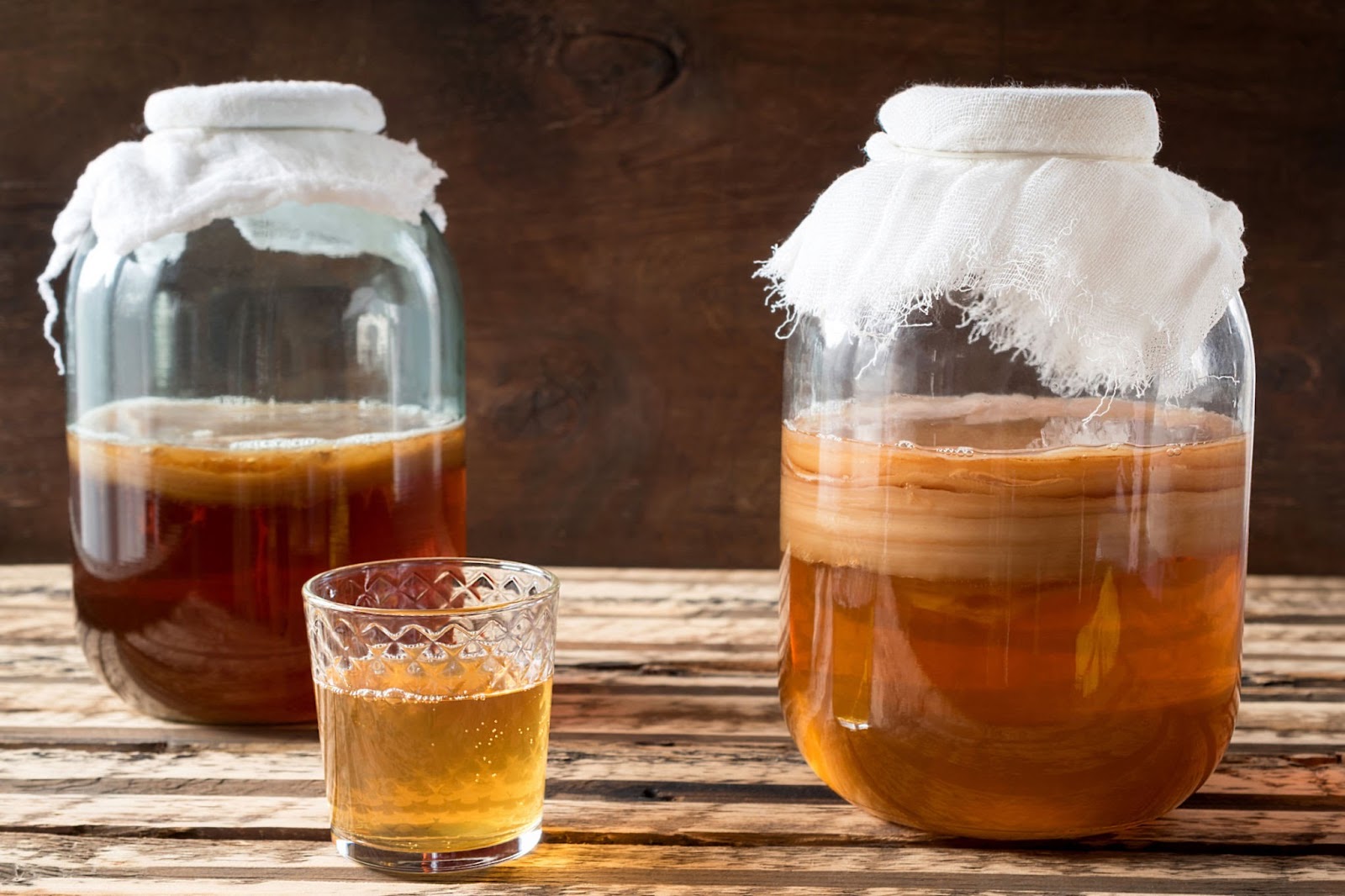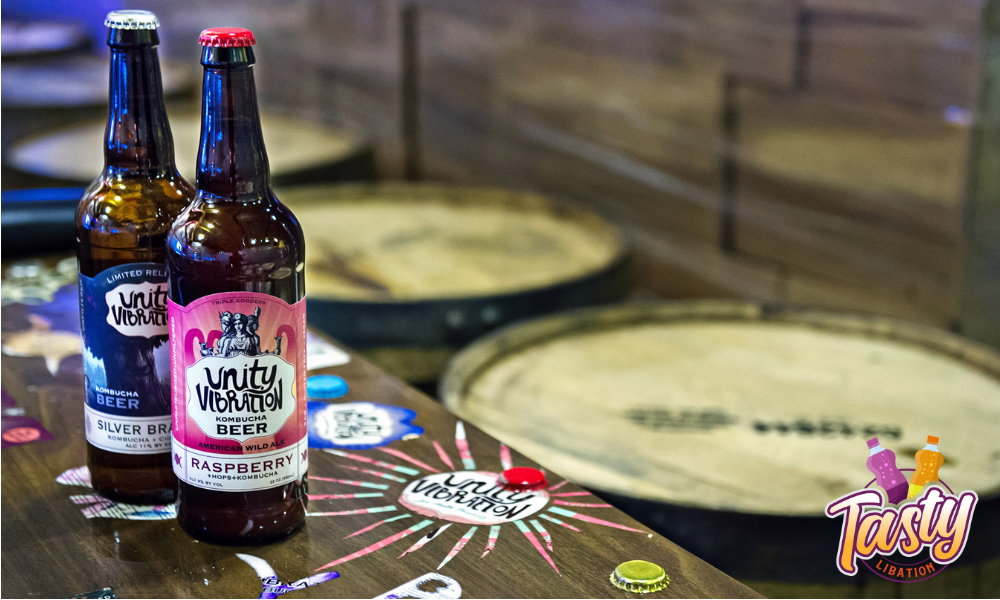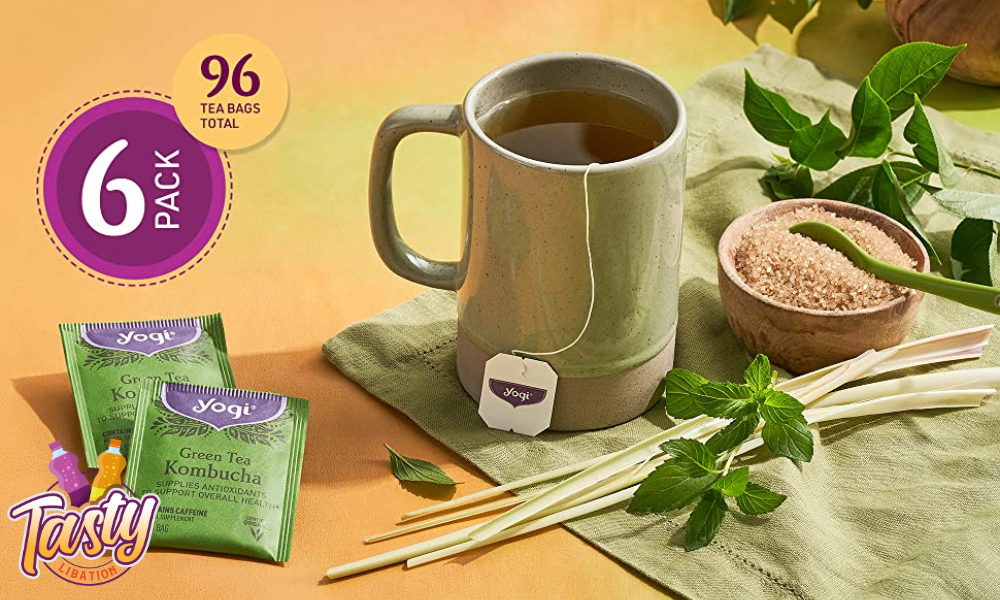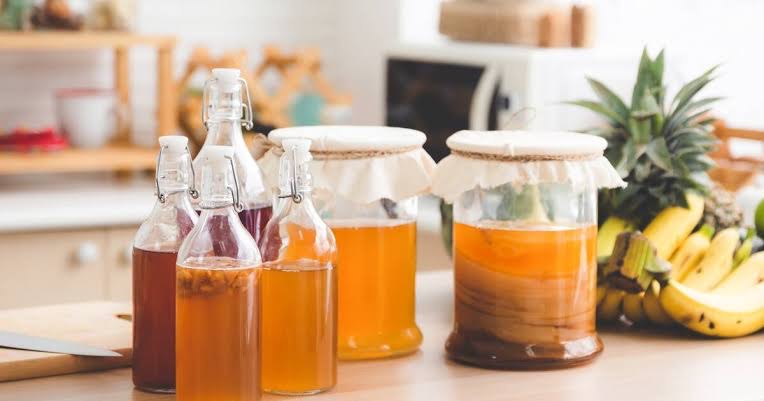If the world was ending tomorrow and we could only pick one last drink to consume, our vote would go to kombucha. Oh, yeah. It’s that serious.
Let’s be honest. There’s nothing better than a glass of some delicious kombucha. This fermented tea has our entire heart (and for all the right reasons, too).
There’s just something about that fizzy, tart goodness that leaves us wanting more. And honestly, can you blame us? How can anybody resist that incredible sweet-and-sour taste?
Plus, it’s not just the delicious flavor we can’t get enough of. It’s also the never-ending health benefits. That’s right! Kombucha isn’t just a tasty treat. It’s also the answer to all of your prayers.
If you’re curious to learn more about this one-of-a-kind beverage, you’ve come to the right place! This is one blog you do not want to miss on Kombucha.
What is the Process?
The secret to success here is fermentation: using microorganisms to convert carbs to acids. When you put a symbiotic culture of bacteria and yeast into a fermentation vessel with tea, magic happens! And before you know it, you have a delicious drink in front of you.
One of the many things we love about kombucha is its incredible brewing process. As complex as it may seem, the results are undoubtedly worth it.
So, whether you want to make the beverage at home or learn the process for fun, we’ve got you covered. And with that being said, let’s get right into it.
Create the Tea Base
To start, we need to prepare some tea. After all, there is no kombucha without this sugary goodness! And to do so, you must follow a couple of simple steps.
Grab a pot, boil some water, and add some tea bags. Be sure to steep for about 10-15 minutes afterward. Once you’re done with that, simply remove the tea bags, add some sugar, and stir well. And boom! There’s your delicious tea right there.
Add the SCOBY to Begin Fermentation
Next, it’s time to discuss an essential ingredient: a symbiotic culture of bacteria and yeast (or, as we like to call it, SCOBY). This thick, rubbery mass is the key to fermentation and kombucha production.
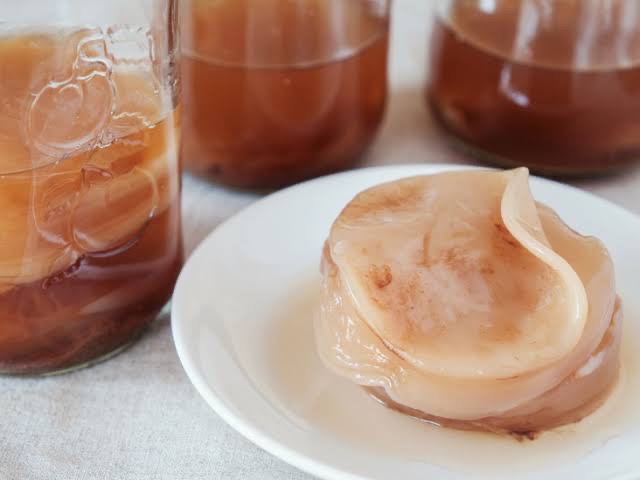
As we mentioned before, fermentation is the process of using microorganisms like yeast and bacteria to turn carbs into organic acids. The acetic acid and lactic acid bacteria join forces with the yeast to make something incredible happen.
Want to know a secret? Adding a SCOBY into your tea creates a loose mat to come in contact with the nutrient medium. And as the mixture meets the air, a series of fantastic chemical reactions occur!
Remember the bacteria and yeast we just talked about? Together, they break down the sugars in your tea and transform them into amino acids, vitamins, and enzymes. And believe it or not, all of this takes place over just 1-4 weeks. Woah.
Make sure you cover the drink with a cloth and leave it at room temperature! The longer you brew it, the stronger the flavor will be.
Simply put, this fermentation process is the reason behind kombucha’s carbonated, slightly sour taste. And honestly? We can’t get enough of it.
Ferment Again
Once the period is over, remove the SCOBY and prepare for the second fermentation process. Oh, yeah. The show isn’t over yet, folks.
Pour the kombucha into some bottles, and add the flavor of your choice for that extra kick. After a couple of days, store the beverage in the fridge. Do not forget this step! We repeat: do not forget this step.
The second fermentation cycle slows down the fermentation and carbonation processes and creates the kombucha you’re dying to have (you and us both).
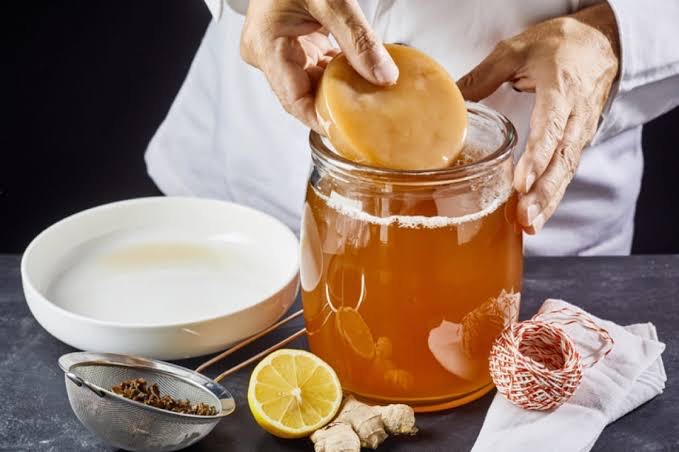
And voilà! That’s the science behind the most delicious drink on the planet. Though the process is lengthy, there’s nothing more satisfying than a successful kitchen experiment. Take our word for it.
Oh, and it gets even better! Fermentation is scientifically proven to increase the concentration of probiotics: bacteria with multiple health benefits.
To put it plainly, what we have here is a refreshing and beneficial beverage. Keep reading to learn more about what kombucha does for you!
What Does Kombucha Do for You?
You’ll be happy to know that kombucha does wonders for your body! Thanks to its antimicrobial, antioxidant, and anti-inflammatory properties, this drink is as healthy as it is delicious. From tackling diabetes to reducing liver inflammation, what can’t kombucha do?
Unlike its fizzy counterparts (we’re looking at you, soft drinks), kombucha is pretty great for your health. According to science, the list of benefits is, well, never-ending.
As we mentioned in the previous section, kombucha is rich in probiotics: bacteria that help your body maintain a community of microorganisms. Research indicates that probiotics improve digestion, decrease inflammation, and fight diarrhea and irritable bowel syndrome.
On top of that, kombucha is also rich in antioxidants: substances that combat free radicals and protect your cells from damage. According to this scientific study, it can regularly decrease liver toxicity caused by various chemicals. Consider us impressed!
Speaking of antioxidants, these babies can also suppress cancer cell growth. Yes, you heard that right! The antioxidants and tea polyphenols in kombucha can end the spread of deadly cancerous cells. Isn’t that incredible?
But wait, there’s more. Scientists believe that kombucha can reduce cholesterol and blood sugar levels, too. And you know what that means, don’t you? You’ll have a lower chance of developing cardiovascular disease and type 2 diabetes.
Lastly, this excellent beverage is also said to be an antimicrobial. That means it can effortlessly combat undesirable bacteria and leave your body happy and healthy.
Okay, we know it sounds too good to be accurate, but we promise we’re telling the truth! It really is magic in the form of effervescent tea.
Who Should Not Drink Kombucha?
Although kombucha is generally considered safe, it may cause side effects in some. And these effects, albeit rare, are still worthy of mentioning! So, with that being said, avoid the beverage if you’re a pregnant or breastfeeding woman or if you have a weak immune system.
Don’t be alarmed! Kombucha is still a fantastic beverage. But as with all things in the world, it’s not necessarily suitable for everyone. And because we care about you, we felt it was important to warn you about the potential dangers.
If you have a weakened immune system because of diagnoses like HIV or kidney disease, you might want to stay away from kombucha. There’s a possibility that it might lead to severe complications, which is the last thing we would ever want for you.
Also, since kombucha is an unpasteurized beverage with slight traces of caffeine and alcohol, it might not be ideal for pregnant or breastfeeding women. And, of course, we all know your baby deserves the world.
Once again, these side effects are relatively uncommon, but we figured we’d bring them to your attention anyway. After all, it’s best to be safe!
Is It Good to Drink Kombucha Every Single Day?
The truth is that too much of anything is harmful, including kombucha. Though the drink has several health benefits, it can also be high in calories and sugar, both of which contribute to unpleasant side effects. If we’re being honest, it all depends on the brand.
Okay, the thing with kombucha is that there are just about a million kinds out there. Seriously. If you’ve ever taken a good look at the aisles of a grocery store, you know they’re loaded with dozens of brands and flavors.
While some of these are low in calories and sugar, others aren’t. And unfortunately, that is where complications begin to arise.
You see, excessive calorie consumption can lead to weight gain and obesity. And to make matters worse, excessive sugar consumption can lead to diabetes, obesity, and heart disease. So if you combine the two, it’s a recipe for disaster.
Certain studies also indicate that drinking too much kombucha can pave the way for bloating and digestive problems. Ouch.
Now, if you think we’re trying to scare you away from kombucha, we promise that’s not the case! We’re just trying to say that moderation is vital. Consuming the beverage now and then won’t harm you, but we believe limiting your intake is best.
We recommend having one to two 8-ounce servings every day for optimal results. Oh, and don’t forget to check the labels and ingredient lists of the kombuchas in your shopping cart! This way, you can enjoy the delicious drink without worrying about anything.
Conclusion
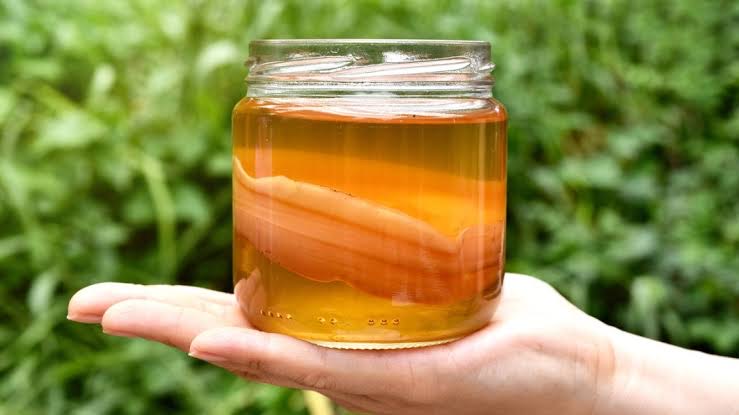
Considering the substantial health benefits of the Kombucha, it’s not hard to see why it’s the hottest new trend in the world. If you make a trip to your nearest supermarket, convenience store, or gas station, you’re likely to see countless kombuchas lining the shelves. And honestly, it’s a sight for sore eyes.
Oh, and don’t even get us started on the incredible sweet-and-sour taste. It’s effervescent, fizzy, acidic, and tangy. What’s not to love? It’s no wonder it’s a key player in the beverage industry today.
Basically, this drink is as tasty as it is functional. So, in short, it’s the best of both worlds. If you’re curious about the flavor (and rightfully so), hop over to your nearest grocery store or try making it yourself!

